An Overview of Catholic Social Thought and its Principles
VerifiedAdded on 2022/09/18
|6
|1510
|29
Essay
AI Summary
This essay provides a comprehensive overview of Catholic Social Thought (CST) and its fundamental principles. It begins by emphasizing the importance of CST in addressing contemporary societal issues, focusing on human dignity and the common good. The essay explores key principles such as human dignity, which underscores the equality of all individuals in the eyes of God, and preference for the poor, advocating for the needs of the vulnerable. It also examines the principle of the common good, highlighting the importance of sacrificing self-interest for the benefit of society. The essay relates these principles to the concepts of community and self, emphasizing the interconnectedness of individual well-being and societal flourishing. Through a critical analysis, the essay concludes that CST aims to balance human liberty with social responsibility, offering a framework for creating a just and equitable society. The essay references several academic sources to support its arguments.
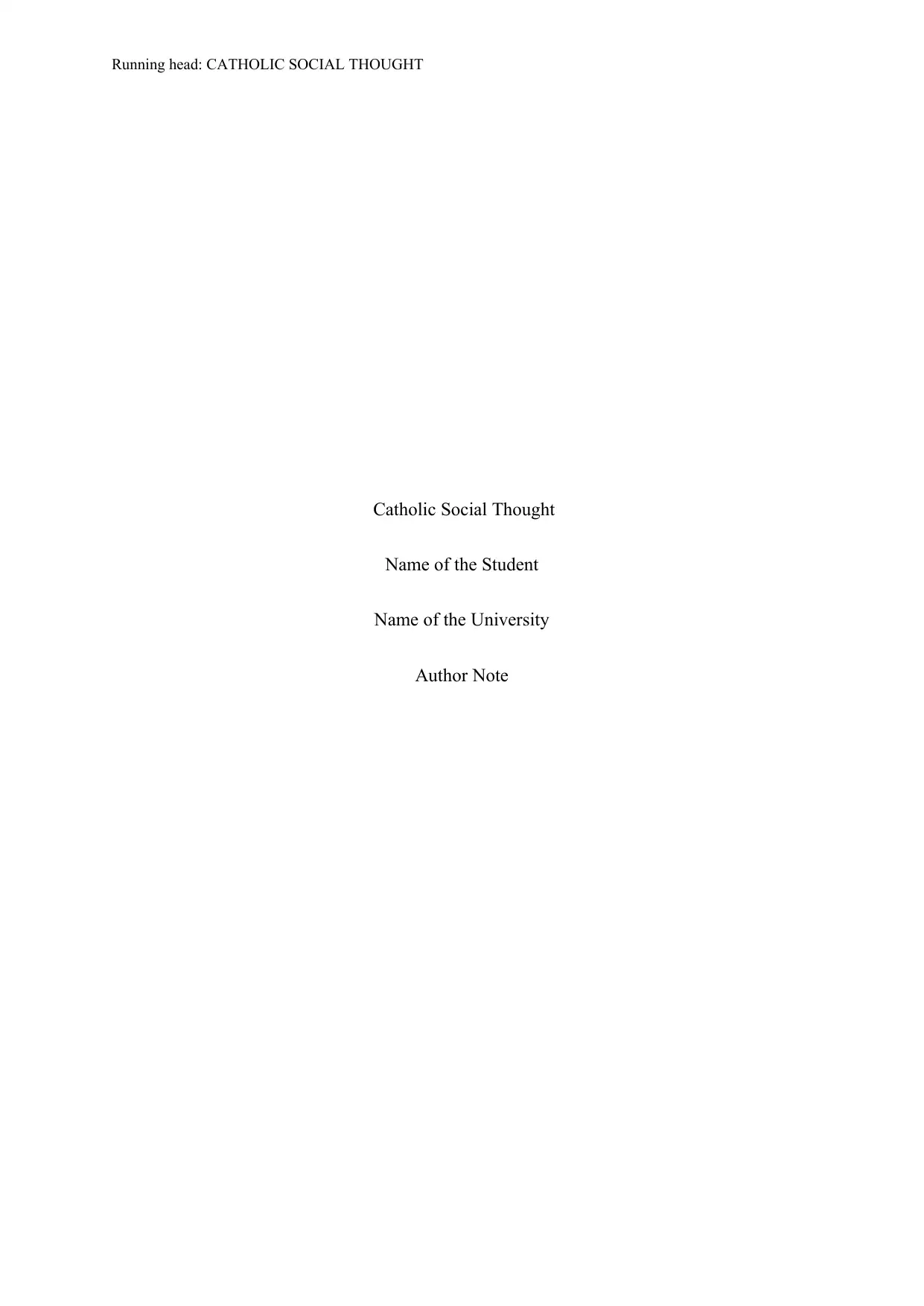
Running head: CATHOLIC SOCIAL THOUGHT
Catholic Social Thought
Name of the Student
Name of the University
Author Note
Catholic Social Thought
Name of the Student
Name of the University
Author Note
Paraphrase This Document
Need a fresh take? Get an instant paraphrase of this document with our AI Paraphraser
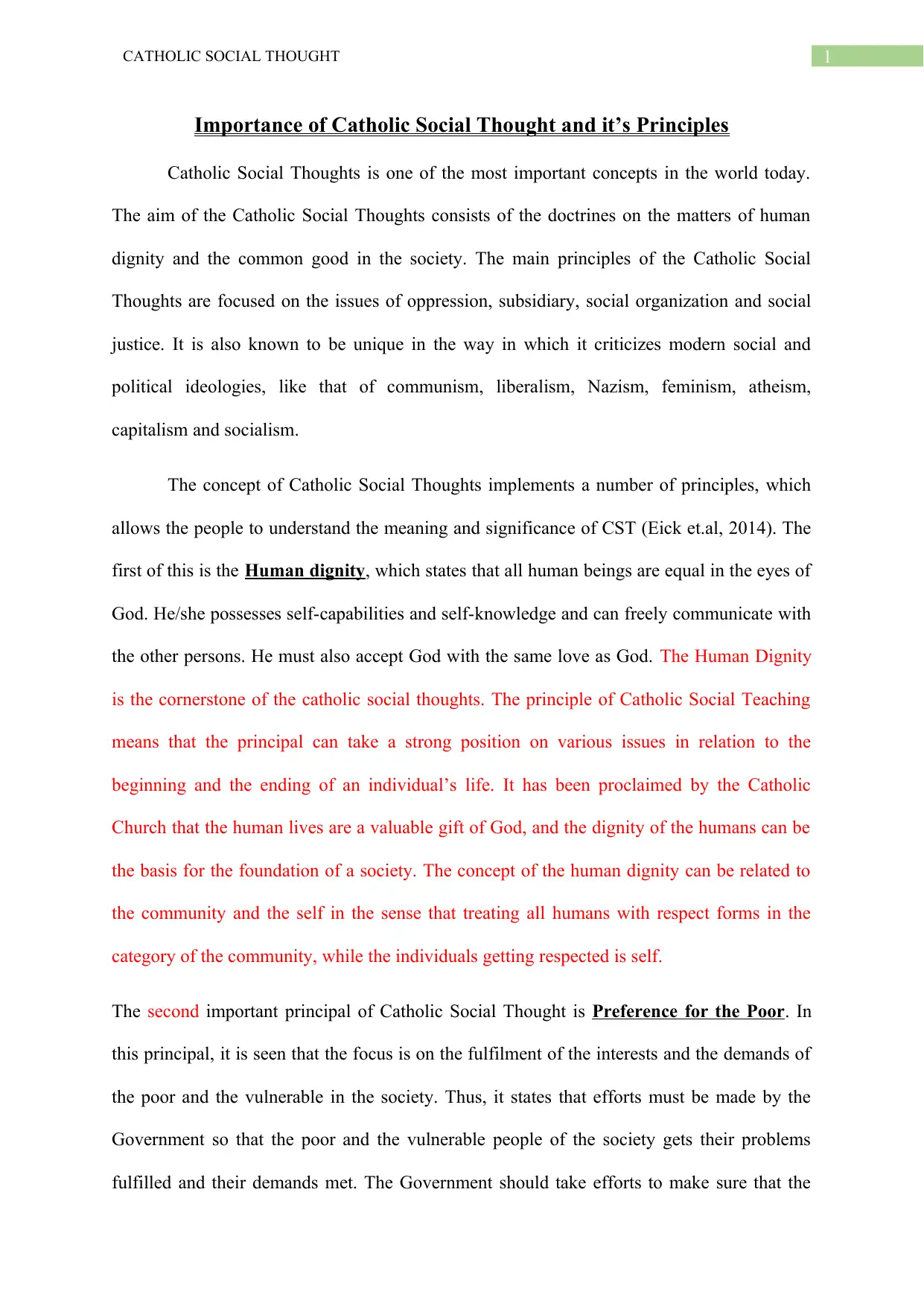
1CATHOLIC SOCIAL THOUGHT
Importance of Catholic Social Thought and it’s Principles
Catholic Social Thoughts is one of the most important concepts in the world today.
The aim of the Catholic Social Thoughts consists of the doctrines on the matters of human
dignity and the common good in the society. The main principles of the Catholic Social
Thoughts are focused on the issues of oppression, subsidiary, social organization and social
justice. It is also known to be unique in the way in which it criticizes modern social and
political ideologies, like that of communism, liberalism, Nazism, feminism, atheism,
capitalism and socialism.
The concept of Catholic Social Thoughts implements a number of principles, which
allows the people to understand the meaning and significance of CST (Eick et.al, 2014). The
first of this is the Human dignity, which states that all human beings are equal in the eyes of
God. He/she possesses self-capabilities and self-knowledge and can freely communicate with
the other persons. He must also accept God with the same love as God. The Human Dignity
is the cornerstone of the catholic social thoughts. The principle of Catholic Social Teaching
means that the principal can take a strong position on various issues in relation to the
beginning and the ending of an individual’s life. It has been proclaimed by the Catholic
Church that the human lives are a valuable gift of God, and the dignity of the humans can be
the basis for the foundation of a society. The concept of the human dignity can be related to
the community and the self in the sense that treating all humans with respect forms in the
category of the community, while the individuals getting respected is self.
The second important principal of Catholic Social Thought is Preference for the Poor. In
this principal, it is seen that the focus is on the fulfilment of the interests and the demands of
the poor and the vulnerable in the society. Thus, it states that efforts must be made by the
Government so that the poor and the vulnerable people of the society gets their problems
fulfilled and their demands met. The Government should take efforts to make sure that the
Importance of Catholic Social Thought and it’s Principles
Catholic Social Thoughts is one of the most important concepts in the world today.
The aim of the Catholic Social Thoughts consists of the doctrines on the matters of human
dignity and the common good in the society. The main principles of the Catholic Social
Thoughts are focused on the issues of oppression, subsidiary, social organization and social
justice. It is also known to be unique in the way in which it criticizes modern social and
political ideologies, like that of communism, liberalism, Nazism, feminism, atheism,
capitalism and socialism.
The concept of Catholic Social Thoughts implements a number of principles, which
allows the people to understand the meaning and significance of CST (Eick et.al, 2014). The
first of this is the Human dignity, which states that all human beings are equal in the eyes of
God. He/she possesses self-capabilities and self-knowledge and can freely communicate with
the other persons. He must also accept God with the same love as God. The Human Dignity
is the cornerstone of the catholic social thoughts. The principle of Catholic Social Teaching
means that the principal can take a strong position on various issues in relation to the
beginning and the ending of an individual’s life. It has been proclaimed by the Catholic
Church that the human lives are a valuable gift of God, and the dignity of the humans can be
the basis for the foundation of a society. The concept of the human dignity can be related to
the community and the self in the sense that treating all humans with respect forms in the
category of the community, while the individuals getting respected is self.
The second important principal of Catholic Social Thought is Preference for the Poor. In
this principal, it is seen that the focus is on the fulfilment of the interests and the demands of
the poor and the vulnerable in the society. Thus, it states that efforts must be made by the
Government so that the poor and the vulnerable people of the society gets their problems
fulfilled and their demands met. The Government should take efforts to make sure that the
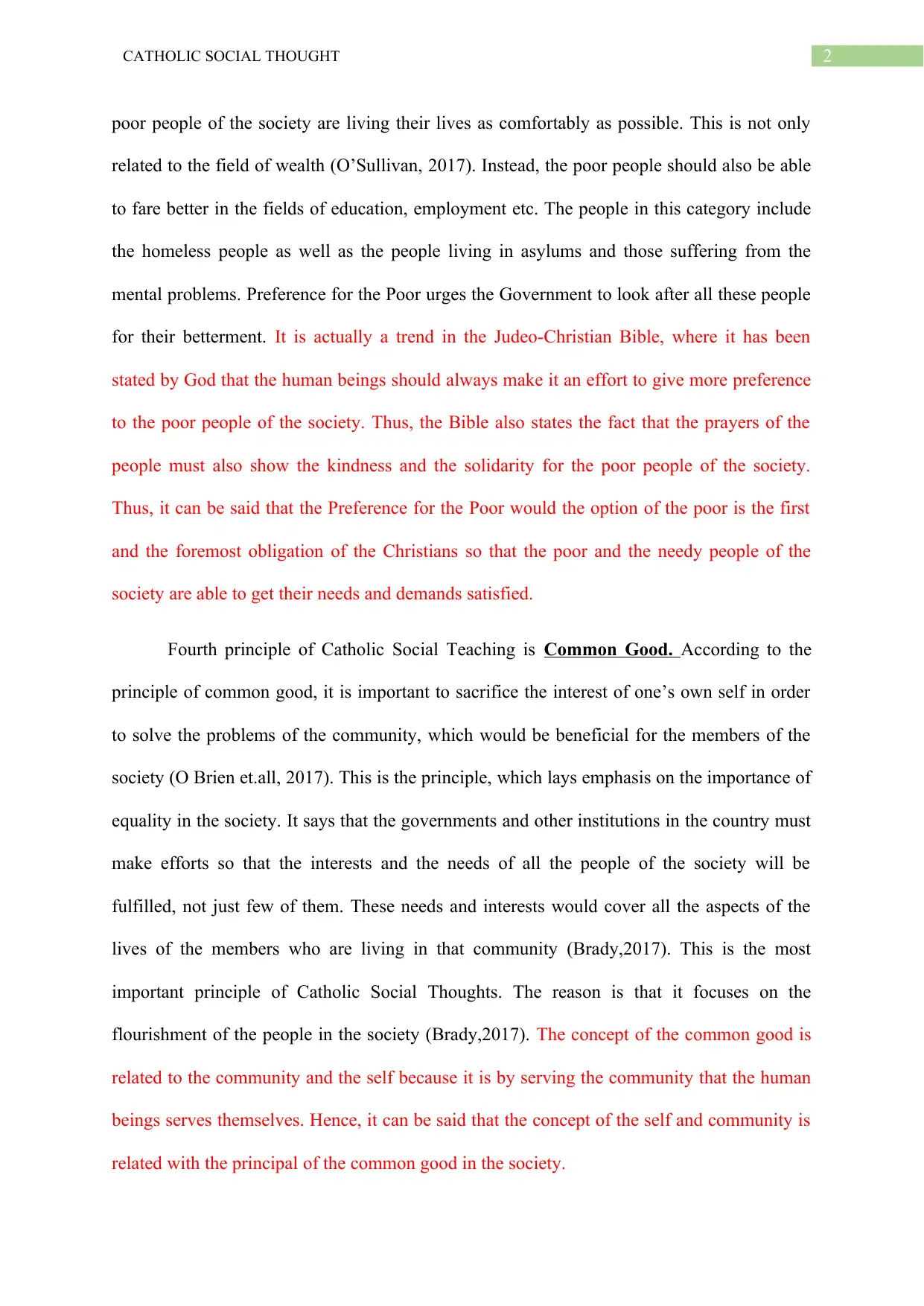
2CATHOLIC SOCIAL THOUGHT
poor people of the society are living their lives as comfortably as possible. This is not only
related to the field of wealth (O’Sullivan, 2017). Instead, the poor people should also be able
to fare better in the fields of education, employment etc. The people in this category include
the homeless people as well as the people living in asylums and those suffering from the
mental problems. Preference for the Poor urges the Government to look after all these people
for their betterment. It is actually a trend in the Judeo-Christian Bible, where it has been
stated by God that the human beings should always make it an effort to give more preference
to the poor people of the society. Thus, the Bible also states the fact that the prayers of the
people must also show the kindness and the solidarity for the poor people of the society.
Thus, it can be said that the Preference for the Poor would the option of the poor is the first
and the foremost obligation of the Christians so that the poor and the needy people of the
society are able to get their needs and demands satisfied.
Fourth principle of Catholic Social Teaching is Common Good. According to the
principle of common good, it is important to sacrifice the interest of one’s own self in order
to solve the problems of the community, which would be beneficial for the members of the
society (O Brien et.all, 2017). This is the principle, which lays emphasis on the importance of
equality in the society. It says that the governments and other institutions in the country must
make efforts so that the interests and the needs of all the people of the society will be
fulfilled, not just few of them. These needs and interests would cover all the aspects of the
lives of the members who are living in that community (Brady,2017). This is the most
important principle of Catholic Social Thoughts. The reason is that it focuses on the
flourishment of the people in the society (Brady,2017). The concept of the common good is
related to the community and the self because it is by serving the community that the human
beings serves themselves. Hence, it can be said that the concept of the self and community is
related with the principal of the common good in the society.
poor people of the society are living their lives as comfortably as possible. This is not only
related to the field of wealth (O’Sullivan, 2017). Instead, the poor people should also be able
to fare better in the fields of education, employment etc. The people in this category include
the homeless people as well as the people living in asylums and those suffering from the
mental problems. Preference for the Poor urges the Government to look after all these people
for their betterment. It is actually a trend in the Judeo-Christian Bible, where it has been
stated by God that the human beings should always make it an effort to give more preference
to the poor people of the society. Thus, the Bible also states the fact that the prayers of the
people must also show the kindness and the solidarity for the poor people of the society.
Thus, it can be said that the Preference for the Poor would the option of the poor is the first
and the foremost obligation of the Christians so that the poor and the needy people of the
society are able to get their needs and demands satisfied.
Fourth principle of Catholic Social Teaching is Common Good. According to the
principle of common good, it is important to sacrifice the interest of one’s own self in order
to solve the problems of the community, which would be beneficial for the members of the
society (O Brien et.all, 2017). This is the principle, which lays emphasis on the importance of
equality in the society. It says that the governments and other institutions in the country must
make efforts so that the interests and the needs of all the people of the society will be
fulfilled, not just few of them. These needs and interests would cover all the aspects of the
lives of the members who are living in that community (Brady,2017). This is the most
important principle of Catholic Social Thoughts. The reason is that it focuses on the
flourishment of the people in the society (Brady,2017). The concept of the common good is
related to the community and the self because it is by serving the community that the human
beings serves themselves. Hence, it can be said that the concept of the self and community is
related with the principal of the common good in the society.
⊘ This is a preview!⊘
Do you want full access?
Subscribe today to unlock all pages.

Trusted by 1+ million students worldwide
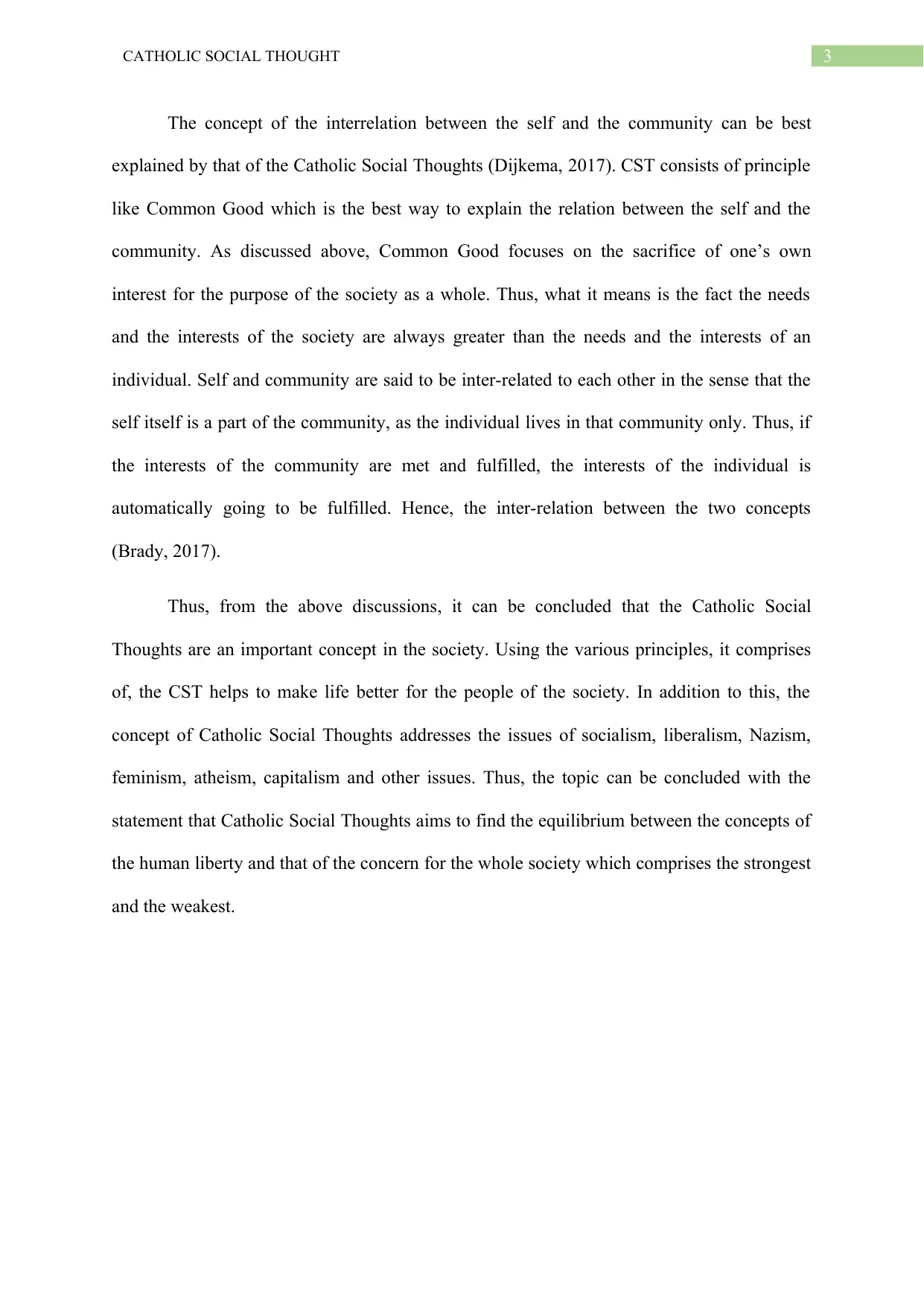
3CATHOLIC SOCIAL THOUGHT
The concept of the interrelation between the self and the community can be best
explained by that of the Catholic Social Thoughts (Dijkema, 2017). CST consists of principle
like Common Good which is the best way to explain the relation between the self and the
community. As discussed above, Common Good focuses on the sacrifice of one’s own
interest for the purpose of the society as a whole. Thus, what it means is the fact the needs
and the interests of the society are always greater than the needs and the interests of an
individual. Self and community are said to be inter-related to each other in the sense that the
self itself is a part of the community, as the individual lives in that community only. Thus, if
the interests of the community are met and fulfilled, the interests of the individual is
automatically going to be fulfilled. Hence, the inter-relation between the two concepts
(Brady, 2017).
Thus, from the above discussions, it can be concluded that the Catholic Social
Thoughts are an important concept in the society. Using the various principles, it comprises
of, the CST helps to make life better for the people of the society. In addition to this, the
concept of Catholic Social Thoughts addresses the issues of socialism, liberalism, Nazism,
feminism, atheism, capitalism and other issues. Thus, the topic can be concluded with the
statement that Catholic Social Thoughts aims to find the equilibrium between the concepts of
the human liberty and that of the concern for the whole society which comprises the strongest
and the weakest.
The concept of the interrelation between the self and the community can be best
explained by that of the Catholic Social Thoughts (Dijkema, 2017). CST consists of principle
like Common Good which is the best way to explain the relation between the self and the
community. As discussed above, Common Good focuses on the sacrifice of one’s own
interest for the purpose of the society as a whole. Thus, what it means is the fact the needs
and the interests of the society are always greater than the needs and the interests of an
individual. Self and community are said to be inter-related to each other in the sense that the
self itself is a part of the community, as the individual lives in that community only. Thus, if
the interests of the community are met and fulfilled, the interests of the individual is
automatically going to be fulfilled. Hence, the inter-relation between the two concepts
(Brady, 2017).
Thus, from the above discussions, it can be concluded that the Catholic Social
Thoughts are an important concept in the society. Using the various principles, it comprises
of, the CST helps to make life better for the people of the society. In addition to this, the
concept of Catholic Social Thoughts addresses the issues of socialism, liberalism, Nazism,
feminism, atheism, capitalism and other issues. Thus, the topic can be concluded with the
statement that Catholic Social Thoughts aims to find the equilibrium between the concepts of
the human liberty and that of the concern for the whole society which comprises the strongest
and the weakest.
Paraphrase This Document
Need a fresh take? Get an instant paraphrase of this document with our AI Paraphraser
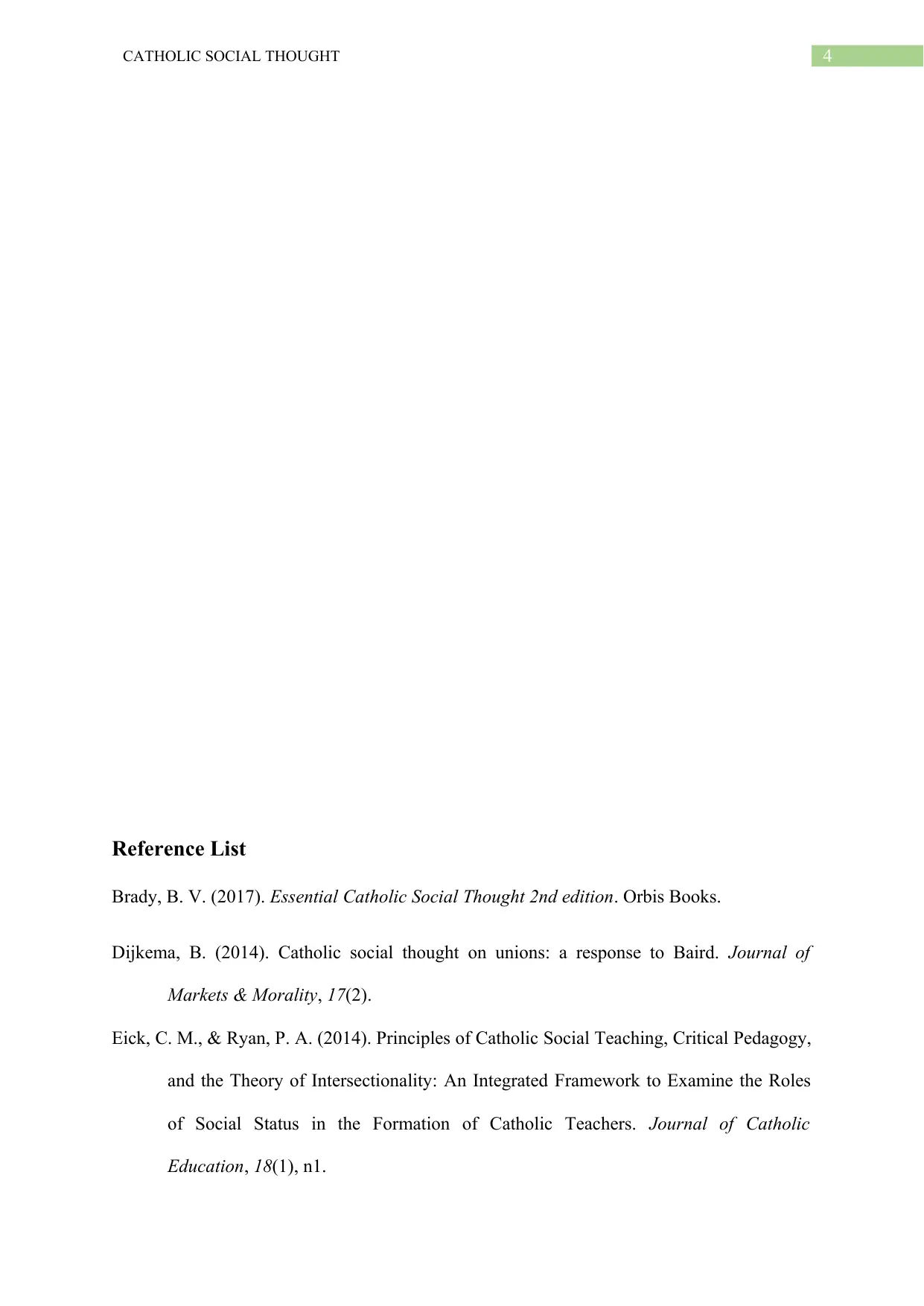
4CATHOLIC SOCIAL THOUGHT
Reference List
Brady, B. V. (2017). Essential Catholic Social Thought 2nd edition. Orbis Books.
Dijkema, B. (2014). Catholic social thought on unions: a response to Baird. Journal of
Markets & Morality, 17(2).
Eick, C. M., & Ryan, P. A. (2014). Principles of Catholic Social Teaching, Critical Pedagogy,
and the Theory of Intersectionality: An Integrated Framework to Examine the Roles
of Social Status in the Formation of Catholic Teachers. Journal of Catholic
Education, 18(1), n1.
Reference List
Brady, B. V. (2017). Essential Catholic Social Thought 2nd edition. Orbis Books.
Dijkema, B. (2014). Catholic social thought on unions: a response to Baird. Journal of
Markets & Morality, 17(2).
Eick, C. M., & Ryan, P. A. (2014). Principles of Catholic Social Teaching, Critical Pedagogy,
and the Theory of Intersectionality: An Integrated Framework to Examine the Roles
of Social Status in the Formation of Catholic Teachers. Journal of Catholic
Education, 18(1), n1.
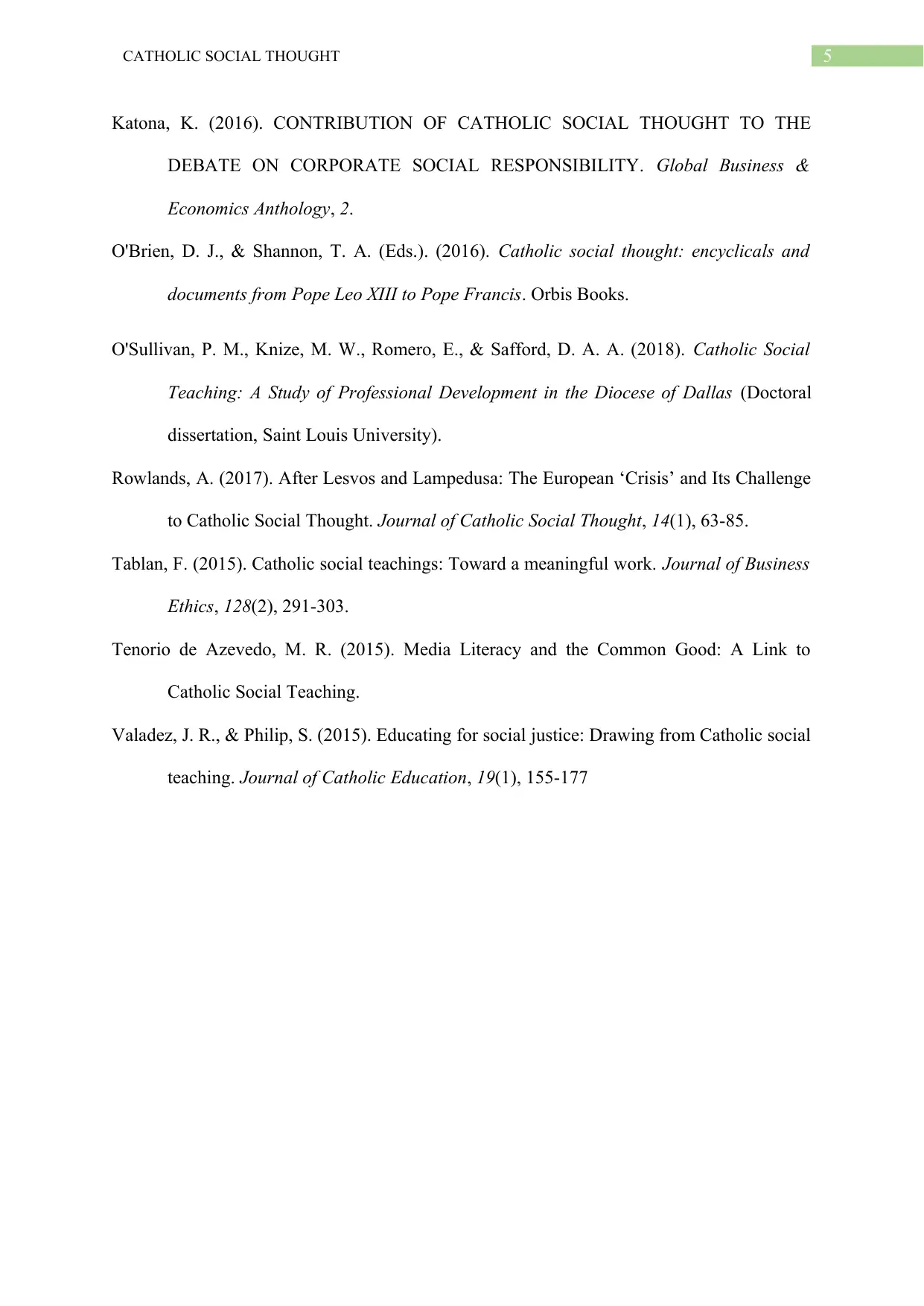
5CATHOLIC SOCIAL THOUGHT
Katona, K. (2016). CONTRIBUTION OF CATHOLIC SOCIAL THOUGHT TO THE
DEBATE ON CORPORATE SOCIAL RESPONSIBILITY. Global Business &
Economics Anthology, 2.
O'Brien, D. J., & Shannon, T. A. (Eds.). (2016). Catholic social thought: encyclicals and
documents from Pope Leo XIII to Pope Francis. Orbis Books.
O'Sullivan, P. M., Knize, M. W., Romero, E., & Safford, D. A. A. (2018). Catholic Social
Teaching: A Study of Professional Development in the Diocese of Dallas (Doctoral
dissertation, Saint Louis University).
Rowlands, A. (2017). After Lesvos and Lampedusa: The European ‘Crisis’ and Its Challenge
to Catholic Social Thought. Journal of Catholic Social Thought, 14(1), 63-85.
Tablan, F. (2015). Catholic social teachings: Toward a meaningful work. Journal of Business
Ethics, 128(2), 291-303.
Tenorio de Azevedo, M. R. (2015). Media Literacy and the Common Good: A Link to
Catholic Social Teaching.
Valadez, J. R., & Philip, S. (2015). Educating for social justice: Drawing from Catholic social
teaching. Journal of Catholic Education, 19(1), 155-177
Katona, K. (2016). CONTRIBUTION OF CATHOLIC SOCIAL THOUGHT TO THE
DEBATE ON CORPORATE SOCIAL RESPONSIBILITY. Global Business &
Economics Anthology, 2.
O'Brien, D. J., & Shannon, T. A. (Eds.). (2016). Catholic social thought: encyclicals and
documents from Pope Leo XIII to Pope Francis. Orbis Books.
O'Sullivan, P. M., Knize, M. W., Romero, E., & Safford, D. A. A. (2018). Catholic Social
Teaching: A Study of Professional Development in the Diocese of Dallas (Doctoral
dissertation, Saint Louis University).
Rowlands, A. (2017). After Lesvos and Lampedusa: The European ‘Crisis’ and Its Challenge
to Catholic Social Thought. Journal of Catholic Social Thought, 14(1), 63-85.
Tablan, F. (2015). Catholic social teachings: Toward a meaningful work. Journal of Business
Ethics, 128(2), 291-303.
Tenorio de Azevedo, M. R. (2015). Media Literacy and the Common Good: A Link to
Catholic Social Teaching.
Valadez, J. R., & Philip, S. (2015). Educating for social justice: Drawing from Catholic social
teaching. Journal of Catholic Education, 19(1), 155-177
⊘ This is a preview!⊘
Do you want full access?
Subscribe today to unlock all pages.

Trusted by 1+ million students worldwide
1 out of 6
Related Documents
Your All-in-One AI-Powered Toolkit for Academic Success.
+13062052269
info@desklib.com
Available 24*7 on WhatsApp / Email
![[object Object]](/_next/static/media/star-bottom.7253800d.svg)
Unlock your academic potential
Copyright © 2020–2025 A2Z Services. All Rights Reserved. Developed and managed by ZUCOL.





